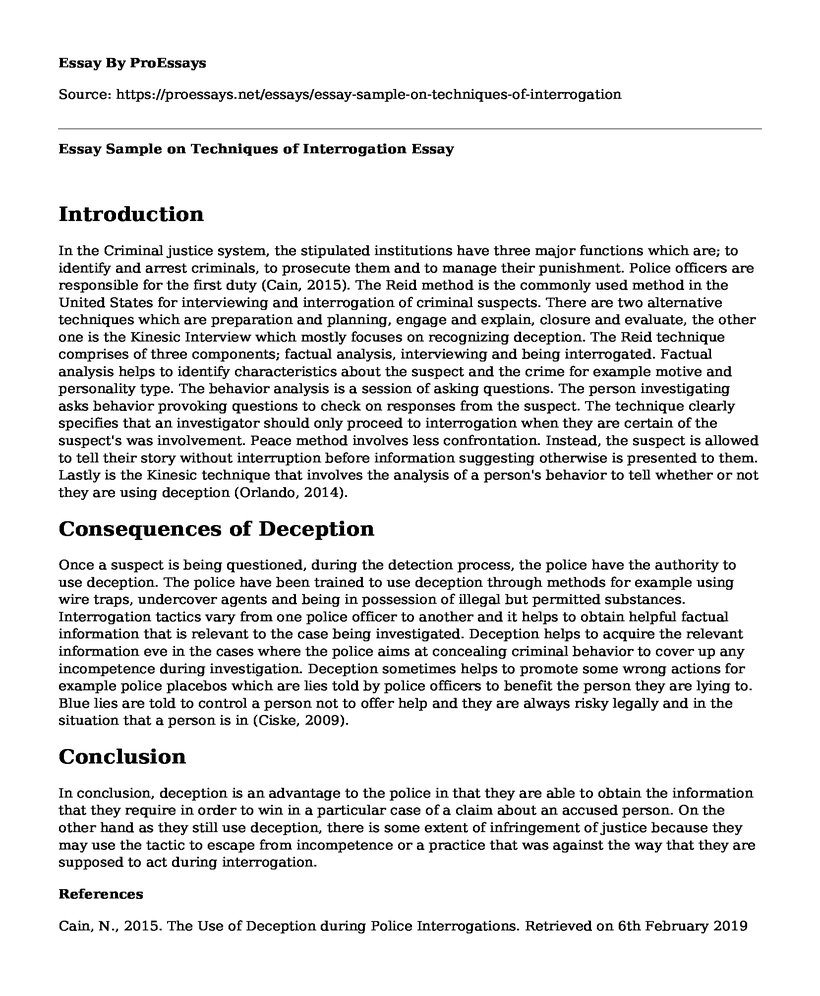Introduction
In the Criminal justice system, the stipulated institutions have three major functions which are; to identify and arrest criminals, to prosecute them and to manage their punishment. Police officers are responsible for the first duty (Cain, 2015). The Reid method is the commonly used method in the United States for interviewing and interrogation of criminal suspects. There are two alternative techniques which are preparation and planning, engage and explain, closure and evaluate, the other one is the Kinesic Interview which mostly focuses on recognizing deception. The Reid technique comprises of three components; factual analysis, interviewing and being interrogated. Factual analysis helps to identify characteristics about the suspect and the crime for example motive and personality type. The behavior analysis is a session of asking questions. The person investigating asks behavior provoking questions to check on responses from the suspect. The technique clearly specifies that an investigator should only proceed to interrogation when they are certain of the suspect's was involvement. Peace method involves less confrontation. Instead, the suspect is allowed to tell their story without interruption before information suggesting otherwise is presented to them. Lastly is the Kinesic technique that involves the analysis of a person's behavior to tell whether or not they are using deception (Orlando, 2014).
Consequences of Deception
Once a suspect is being questioned, during the detection process, the police have the authority to use deception. The police have been trained to use deception through methods for example using wire traps, undercover agents and being in possession of illegal but permitted substances. Interrogation tactics vary from one police officer to another and it helps to obtain helpful factual information that is relevant to the case being investigated. Deception helps to acquire the relevant information eve in the cases where the police aims at concealing criminal behavior to cover up any incompetence during investigation. Deception sometimes helps to promote some wrong actions for example police placebos which are lies told by police officers to benefit the person they are lying to. Blue lies are told to control a person not to offer help and they are always risky legally and in the situation that a person is in (Ciske, 2009).
Conclusion
In conclusion, deception is an advantage to the police in that they are able to obtain the information that they require in order to win in a particular case of a claim about an accused person. On the other hand as they still use deception, there is some extent of infringement of justice because they may use the tactic to escape from incompetence or a practice that was against the way that they are supposed to act during interrogation.
References
Cain, N., 2015. The Use of Deception during Police Interrogations. Retrieved on 6th February 2019 from https://inpublicsafety.com/2015/12/the-use-of-deception-during-police-interrogations-2/
Orlando, J., 2014. Interrogation Techniques. Retrieved on 6th February 2019 from https://www.cga.ct.gov/2014/rpt/2014-R-0071.htm
Ciske, M., 2009. The Ethics of Police Deception. Retrieved on 6th February 2019 from https://www.ohio.edu/ethics/1999-conferences/the-ethics-of-police-deception/
Cite this page
Essay Sample on Techniques of Interrogation. (2022, Nov 24). Retrieved from https://proessays.net/essays/essay-sample-on-techniques-of-interrogation
If you are the original author of this essay and no longer wish to have it published on the ProEssays website, please click below to request its removal:
- Abolishing the Juvenile System - Essay Sample
- National Crime Victims Survey Analysis Paper Example
- Integrated Criminology Theories Essay
- History and the Current State of Forensic Pathology Essay Example
- Essay Example on UK Parliament Sovereignty: Ultimate Legal Authority
- Essay Example on Foodservice Cost Control: Issues & Recommendations
- Essay Example on Dream/Killer: True Story of Wrongful Conviction in 2015 Documentary







